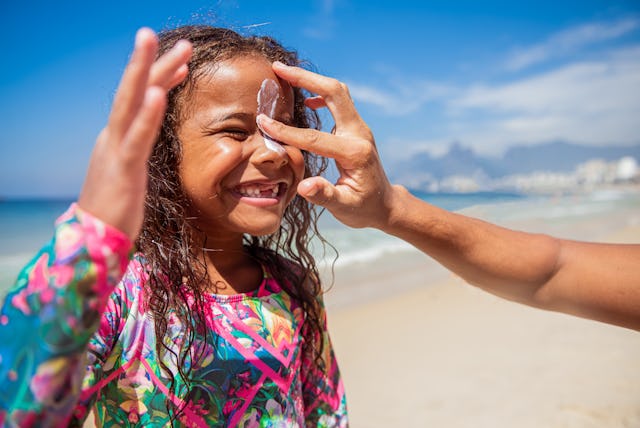Does Sunscreen Expire? Actually, Yeah & Here’s How To Tell Yours Needs Replacing
This doesn’t smell like coconuts anymore...

Summertime, and the livin's easy — except the part where you have to get your wriggly ass kids to hold still long enough to apply sunscreen after hauling everything you own down to the beach like a pack mule to boot. So it's good to answer this question before you pack your many beach bags. Does sunscreen expire? The answer might surprise you, and you'll want to make sure you know your sunscreen's status before you get all the way to the beach.
Does sunscreen expire?
Yes, it does. Chemical and physical sunscreens both go bad over time, according to Dr. Maya Thosani, a board-certified dermatologist in Scottsdale, Arizona. Chemical sunscreens contain compounds like avobenzone, oxybenzone, and octinoxate, which can break down in three different ways, she says:
- Exposure to UV light, which produces free radicals
- Exposure to air or heat, which causes oxidation
- Hydrolysis, meaning the ingredients break down in water, which is part of many sunscreen formulas
"Physical sunscreens contain compounds like zinc oxide, titanium dioxide, or iron oxide. These can break down by separating and sediment, which can make it apply unevenly. Many of these are best applied by shaking the bottle first," Thosani adds.
"When it comes to chemical sunscreens, those with active ingredients typically last a year or two. After opening and using it, it's always best to use it within the year because the filters break down over time, especially with heat and UV exposure. Chemical sunscreens seem to have a slightly decreased shelf life when compared with physical sunblocks, which have a shelf life of two to three years when they aren't opened. That's because the active ingredients in physical blocks are more stable. However, if there is a separation of the cream or lotion base, that can affect its performance."
How long does sunscreen last after opening?
Most sunscreens will have an expiration date printed on their packaging. "The typical shelf life is three years if it is unopened and has not been exposed to high heat. Otherwise, usually once opened, most sunscreens should be tossed within a 12-month period," Thosani says.
That's because your sunscreen could still go bad before that date if it's left out in the heat or exposed to a lot of water (which, when it goes with you to the pool and beach all summer, is likely). "On another note, leaving a tube of sunscreen in direct heat or sun can accelerate its degradation, even if a product is within its expiration window," says Dr. Kimberly Lee, board-certified facial plastic and reconstructive surgeon. Leaving it in your hot car can cause it to break down quicker, too.
These are some signs it's time to buy a new tube, according to Lee:
- The color, scent, or texture has changed.
- The product no longer applies smoothly or is separated, grainy, curdled, or clumpy.
- The tube is bulging.
- The container is cracked or leaking.
Choosing a sunscreen with a small opening, rather than a jar you have to dip your fingers into, also helps prevent bacteria from getting into the formula and making it go bad early, Thosani says, adding that you should always store your SPFs in a cool, dry place and shake them well before using. Lee recommends writing the date you opened it on the bottle with a permanent marker, and if you can't remember how long it's been open, just replace it to be safe.
Is expired sunscreen still OK to use?
Sunscreen isn't cheap, of course, and you just bought this massive bottle last summer. But it's risky to use a sunscreen if you're unsure that it's still going to work, Lee says.
"The greatest risk is really the reduced protectiveness of the expired sunscreen," Lee says. "You may think you are being protected, but sunscreens that are no longer effective, or degraded, won't block or absorb UV rays the way they should. And this leads to increased risk of sunburn, premature aging, and skin cancer. Other risks of using expired sunscreen ingredients that break down and become irritating, and this is particularly true for chemical sunscreens."
So yes, it's frustrating to have to replace a tube of SPF just because you have a hunch it's a little old. But your skin will absolutely thank you for dropping the extra cash on a fresh one before hitting the pool.